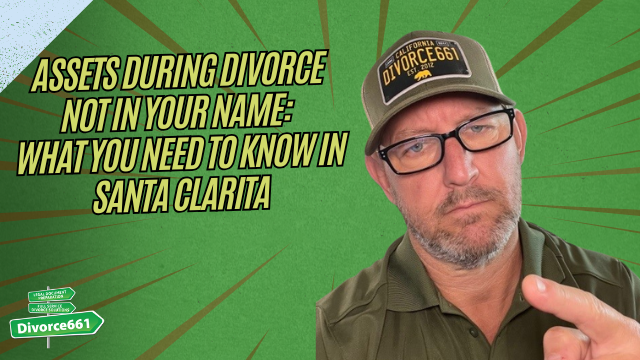Assets During Divorce Not In Your Name: What You Need to Know in Santa Clarita
When navigating a divorce, understanding how assets and debts are divided can be complex, especially when some property isn’t explicitly in both spouses’ names. This is a crucial topic for anyone going through a divorce in Santa Clarita or anywhere within California’s community property jurisdiction. In this article, we’ll break down the essentials of how assets and debts are treated during a divorce, even if they aren’t titled under both spouses’ names.
What Is Community Property?
California is a community property state, which means that most assets and debts acquired during the marriage are considered jointly owned by both spouses, regardless of whose name is on the title or account. This principle applies broadly, covering everything from real estate and vehicles to bank accounts and debts.
So, even if an asset or debt is not in both your names, it is still technically considered community property if it was acquired during the marriage. This means that during a divorce, the court will generally treat these assets and debts as belonging equally to both parties.
Why Does It Matter if an Asset Isn’t in Your Name?
Many people assume that if an asset or debt is only in one spouse’s name, it automatically belongs solely to that spouse. However, under community property laws, this is not the case. The timing and source of acquisition are more important than the name on the title.
For example, if your spouse bought a car during the marriage but only put their name on the title, the car is still community property. Similarly, debts incurred during the marriage, even if only one spouse’s name is on the loan, are generally considered community debts.
Implications for Property Division
- Equal Division: Community property is typically divided equally in a divorce, meaning assets and debts acquired during the marriage are split 50/50 unless otherwise agreed upon.
- Hidden or Untitled Assets: Assets not titled jointly can sometimes be overlooked, but they are still subject to division. It’s important to disclose all property and debts during divorce proceedings.
- Separate Property Exceptions: Property acquired before marriage or through inheritance/gifts specifically to one spouse may be considered separate property and not subject to division.
What Should You Do If You Suspect Untitled Assets or Debts?
Transparency and full disclosure are key during divorce negotiations. If you believe there are assets or debts that have not been disclosed or are not in your name but were acquired during the marriage, it’s crucial to address these early on.
Working with a knowledgeable family law attorney can help ensure that all community property is accounted for and fairly divided. They can also assist with uncovering hidden assets or clarifying the status of debts.
Conclusion: Protecting Your Interests in Community Property
Understanding that assets and debts acquired during marriage are considered community property—even if they are not in both spouses’ names—is vital for anyone going through a divorce in Santa Clarita. This knowledge empowers you to protect your interests and ensure a fair division of property.
If you’re facing a divorce and want to learn more about how community property laws affect your situation, it’s wise to consult with a qualified family law professional who can guide you through the process and help you secure the best possible outcome.
Remember, community property laws exist to fairly divide what was built together during the marriage, regardless of whose name appears on the title or account.

